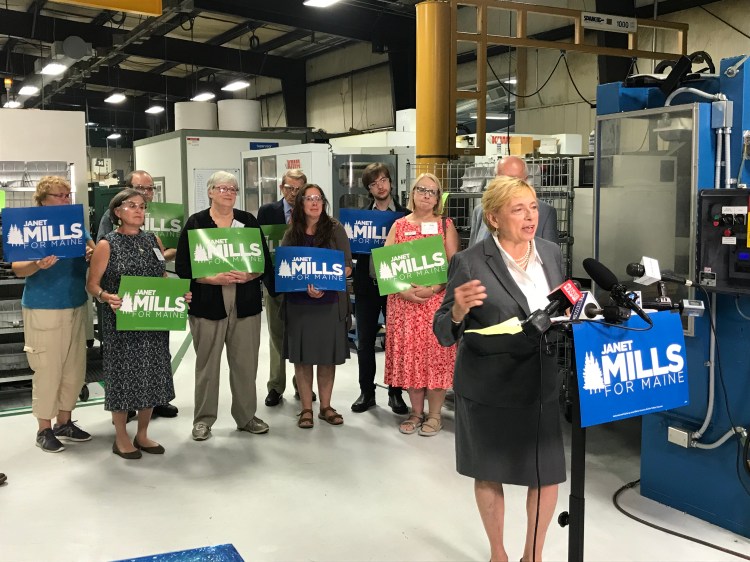AUGUSTA — Gubernatorial candidate Janet Mills unveiled an “action plan” Tuesday that would create a “one-stop shop” for businesses, provide no-interest loans to help hire new employees and lure former or new Mainers to the state with tax incentives.
In the first of several anticipated policy rollouts, the Democratic nominee said her plan aims to streamline services for small businesses while encouraging investment in new employees as well as rural communities. Mills, a Farmington resident who was elected Maine’s first female attorney general in 2008, pointed to a recent report from the Maine Department of Labor forecasting stagnant job growth over the next eight years as evidence that Republican Gov. Paul LePage’s approach has not worked for the state.
“This election, to me, is about one simple and fundamental question: After eight long years, do we want to continue the status quo with a Shawn Moody? Or do we want to embrace change and take Maine in a new and better direction?” Mills said while standing at the entrance of a noisy factory floor at Kennebec Technologies, a high-precision machine shop that makes parts for the military and other buyers. “I think it is time for a new direction.”
Mills is one of four candidates – along with businessman Moody, economic development consultant Alan Caron and State Treasurer Terry Hayes – seeking to win the Blaine House this November as LePage winds down his second term. While the limited number of polls suggest the race is a tossup between Mills and Moody, Caron and Hayes are pledging to bring more independent leadership to Augusta after years of increasingly intense partisanship.
Despite historically low unemployment levels, Maine’s economy is still a major issue in the 2018 campaigns. That’s because Maine’s aging population, losses in traditional manufacturing industries, stagnant wages and the lure of better-paying jobs in other states continue to combine to create a workforce shortage for the foreseeable future.
Among other things, Mills said her plan would:
n Consolidate more than 15 economic development, workforce training and business finance agencies into the Maine Growth Authority while creating a “one-stop-shop” Small Business Accelerator to help businesses navigate the state bureaucracy.
n Launch a Job Growth Loans Program to provide no-interest, 18-month loans to small businesses to help cover the costs of bringing on additional employees.
n Create new Broadband Expansion Districts, modeled after current utility districts, to encourage collaboration among towns and direct funding toward expansion of high-speed internet in rural Maine.
n Allow former Maine residents moving back to the state or new residents to claim a $500 tax credit to cover moving costs while eliminating any tax or regulatory costs on out-of-state employers that allow workers to work remotely in Maine.
“For years, our children have left the state in droves and we’ve done nothing to welcome them back,” Mills said. “This program puts the welcome mat back out.”
She also proposed renaming the University of Maine at Augusta as Maine State College and making the campus a “portal” for remote learning.
With her emphasis on “streamlining” and reducing unnecessary regulations, Mills echoed pledges made by LePage during his 2010 and 2014 campaigns as well as those of her Republican opponent – Moody, of Gorham.
The owner of an 11-shop auto body repair chain, Moody is campaigning on his successful business track record and has promised to continue LePage’s focus – if not his controversial governing style – on improving the climate for businesses, reducing taxes and reining in welfare programs.
CRITICISM, OPPONENT’S PROPOSALS
Both the Moody campaign and the Maine Republican Party dismissed Mills in short statements that did not respond to any specific policy proposals.
“Nothing Mills can put on paper can help her escape her record of job-killing taxes and red tape,” said Moody campaign strategist Brent Littlefield. “Only Shawn Moody has a lifelong career of creating jobs and growing Maine’s economy.”
“The one time that Janet Mills got involved in economic issues was in support of the Baldacci agenda, which left our state ravaged with a massive unemployment rate, a $1.3 billion budget deficit, huge hospital debt, and government regulations crushing small businesses,” said Jason Savage, executive director of the Maine Republican Party. “Janet Mills’ track record shows that Mainers can expect lots and lots of tax increases and budget deficits if she is elected governor.”
Moody has yet to release any detailed economic development or jobs-related proposals. But on his campaign’s website, Moody pledges to “perform a comprehensive review of all government red tape with the goal of increasing speed of permitting, reducing fees and eliminating duplication,” and to create a Governor’s Initiative on Regulatory Reform – two issues that LePage also campaigned on.
Moody said the state should also conduct exit interviews with companies leaving Maine or moving to the state about issues inhibiting job and economic growth while creating a “customer service hotline” for businesses exploring locating in Maine.
ideas of OTHER CANDIDATES
The two independents in the gubernatorial race – Caron, of Freeport, and Hayes, of Buckfield – have also released some details of their economic plans, if elected.
Caron, who as a consultant has produced multiple reports on improving Maine’s economic climate, pledged to make use of Maine’s reputation for a clean environment and high quality of life as a way “to brand Maine as a great place to start a business and raise a family.” He also called for redirecting tax breaks and incentives programs to smaller businesses rather than larger corporations, and pledged to be the “Convener-in-Chief” to bring together the private sector, higher education, nonprofits and workforce development programs.
Hayes, who has served as Maine state treasurer since 2014, has said she would embrace the “Making Maine Work” report prepared by the Maine State Chamber of Commerce, the Maine Development Foundation and EducateMaine. Among other things, that report recommended using college tuition incentives and debt-forgiveness programs to encourage graduates to locate in Maine, commit $100 million annually for five years to broadband expansion, help working adults and students receive professional credentials, attract more skilled immigrants and scale up the effort to promote Maine as a career destination.
Hayes also has proposed creating an Office of Workforce Development to work with industry and educational institutions to ensure Maine is preparing residents for available jobs and to invest more in research and development.
Kevin Miller can be contacted at 791-6312 or at:
Twitter: KevinMillerPPH
Send questions/comments to the editors.






